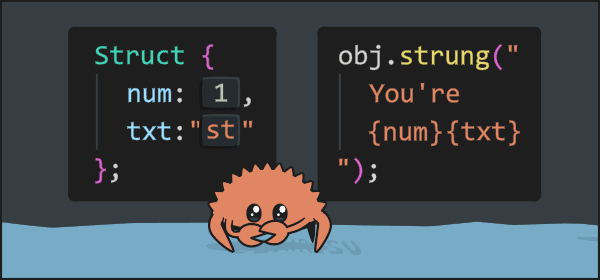AirScript
It's like Lua, but in Rust, and different.
Introduction
AirScript is a dynamically typed, interpreted language inspired by Lua and written in Rust.
Just like Lua, the interpreter is a stack-based virtual machine. The VM provides an API to manipulate this stack, allowing you to:
- push/pop primitive values
- push/pop custom Rust types
- push/pop (and call) Rust functions
- ...
Example:
use airscript::prelude::*;
use airscript::interpreter::{VM, FuncReturns};
fn square(vm: &mut VM<()>) -> Result<usize> {
let a = vm.pop_integer()?;
vm.push_integer(a * a);
Ok(1)
}
fn main() {
let mut vm: VM<()> = VM::new();
vm.push_integer(2);
vm.push_rust_function(square);
vm.call(1, FuncReturns::Exactly(1)).unwrap();
let res = vm.pop_integer().unwrap();
println!("{}", res); // prints: 4
}
Unlike Lua, the syntax is inspired by Rust and Go.
Example:
func make_action(kind) {
func action(fn) {
print(kind <> ": " <> fn() <> "\n");
}
return action;
}
func greeter(name) {
func greet() {
return "hello " <> name;
}
return greet;
}
let say := make_action("say");
let greet := greeter("world");
say(greet); // prints: say: hello world
To provide your own Rust types to the VM:
use airscript::prelude::*;
use airscript::interpreter::{VM, FuncReturns};
#[derive(Debug, Clone)]
struct Vector {
pub x: f64,
pub y: f64,
}
fn vec_mag(vm: &mut VM<Vector>) -> Result<usize> {
let v_ref = vm.pop_userdata()?;
let v = v.lock().unwrap();
let m = (v.x * v.x + v.y * v.y).sqrt();
vm.push_float(m);
Ok(1)
}
fn main() {
let mut vm: VM<Vector> = VM::new();
vm.push_userdata(Vector { x: 3f64, y: 4f64 });
vm.push_rust_function(vec_mag);
vm.call(1, FuncReturns::Exactly(1)).unwrap();
let res = vm.pop_float().unwrap();
println!("{}", res); // prints: 5
}
Disclaimer
This is still a Work In Progress:
- the VM's API is not complete nor definitive
- the syntax is not complete nor definitive
- the semantics are not specified
License
This project is released under the terms of the MIT License.




